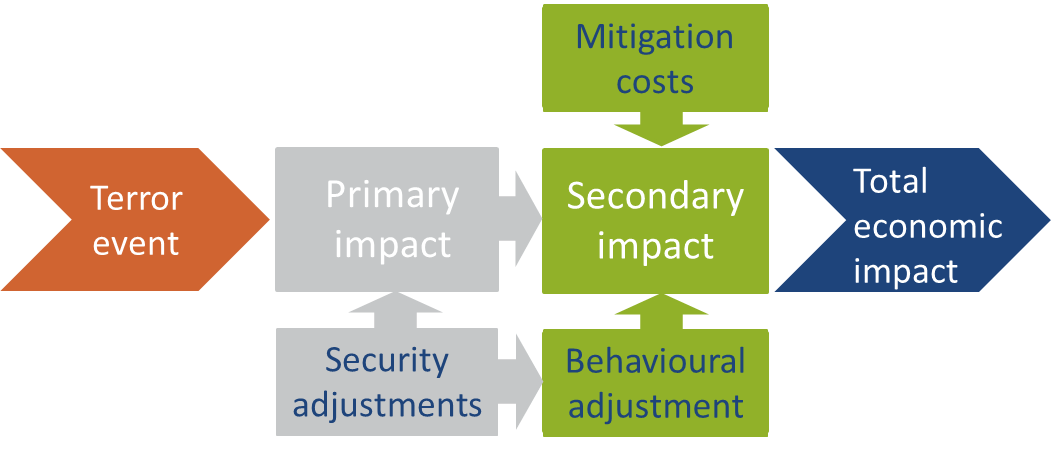Economic effects of anti-terrorism security measures
Economic effects of anti-terrorism security measures
Security measures aiming to manage the risk of urban terrorism impose economic effects on society, the so-called economic effects of anti-terrorism measures. In essence, they can be classified as the costs of terrorism since they result from the actions of households, private agents and public agents in an attempt to prevent a terror event to occur, or at least to mitigate the effects of such an event.
Description
Estimation of the economic impact of counter-terrorism measures includes accounting for direct (primary) and indirect (secondary) effects, including both the costs and the benefits. Security measures, for example, make urban objects more resilient against terror attacks, but will also alter behaviour of economic agents (see the clickable map below). Moreover, security measure aiming to mitigate the indirect economic impact will create positive spillover effects for the local economy, since the impact of an future terror event will be less unpredictable. Finally, also the actual impact on terrorist behaviour should be taken into account in order to measure the effectiveness of the chosen security measures.
There is not much literature available on the economic impact of counter-terrorism measures and little definite conclusions can be drawn. Still, it is possible to illustrate that the economic impact of security measures vary greatly, depending on the type of measures and the way they are implemented (and in which context).
Costs of security
The costs of security measure depend on the actual type of counter-terrorist measures. Enders and Sandler (2006)[1] differentiate between defensive and pro-active security measures. Defensive security measurs protect urban objects from attacks or mitigate the impact. Pro-active measures are meant to prevent terrorism itself, e.g. by undermining the financial resources of terrorist groups.
Direct (primary) costs of security
Defensive security measures entail financial investments in security technologies, surveillance, etc. Pro-active security measures entail the resources needed to finance intelligence operations, military strikes, development aid, etc.
Indirect (secondary) costs of security
Indirect costs of counter-terrorism measures are distributed throughout society as a result of changed economic behaviour of agents (behavioural adjustment) and the impact on functionality of urban objects (e.g. travel delays as a result of security on airports and roads, changes in property values). A prime example of behavioural adjustment is that protection measures such as barricading, surveillance, security announcements and access-restricting security checkpoints may also enhance fear and anxiety (the "fear factor"), which can have negative health consequences, and, hence, also create negative consequences for the economy due to changes in economic behaviour[2]. For instance, Rose et al (2009)[3] estimated the effect of the nearly 2-year downturn in air travel and related tourism in the U.S. following 9/11 at $85 billion.
Benefits of security
Direct (primary) benefits of security
The inflicted economic damage of a terror event is the start of an estimation of the benefits of security measures since they constitute the direct benefits of the mitigation measures[4]. Examples of direct impacts of terror events are: loss of life and injuries, property damage, business interruption, and damage to iconic objects[5]
Indirect (secondary) benefits of security
Related subjects
- Economic main page
- belongs to::Economic impact
- Economic impact of urban planning
- Economic impact of security threats
- Economic impact of security measures
- Economic effects of anti-crime security measures
- Economic effects of anti-terrorism security measures
- Economics of criminal and terrorist behaviour
- Economic tools
- Economic output
Footnotes and references
- ↑ See: Brück, T., M. Karaisl, and F. Schneider (2008). A survey of the Economics of Security. Economics of Security Working Paper 1. Economics-of-Security.eu.
- ↑ Mueller, J. (2008).The Quixotic quest for invulnerability: Assessing the costs, benefits, and probabilities of protecting the Homeland.
- ↑ Rose, A., G. Oladosu, B. Lee, and G. Beeler Asay (2009). The Economic Impacts of the 2001 Terrorist Attacks on the World Trade Center: A Computable General Equilibrium Analysis. Peace Economics, Peace Science, and Public Policy, 15(2), Article 4.
- ↑ See: Rose, A. and S. Chatterjee (2011). Benefits and Costs of Counter-Terrorism Security Measures in urban Areas, p.7.
- ↑ Ibid.
MAP
<websiteFrame> website=http://securipedia.eu/cool/index.php?wiki=securipedia.eu&concept=Economic_effects_of_ant-terrorism_security_measures height=1023 width=100% border=0 scroll=auto align=middle </websiteFrame> <headertabs/>

